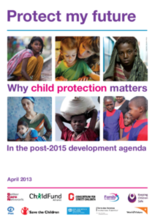Demographic Data
|
Sources: World Bank, UNDP, UNAIDS, DHS 2013 |
Displaying 12581 - 12590 of 14390
Retrak is an organization that works with street children in Africa. This report offers an evaluation of the impact of Retrak's programs in Ethiopia and Uganda in its pilot period (2011 and 2012) and the progress of the children involved in the programs using the Child Status Index (CSI), as a measurement of child wellbeing and a tool for tracking children’s progress as they transition from the street to family homes.
This paper is the culmination of a series of inter-agency papers on the links between child protection and major development goals, designed to feed into the thematic debates around the post-2015 development framework.
This Program Review documents the evolution of EveryChild/Partnerships for Every Child’s Program in Moldova since 1994, presenting the development of interventions to improve the lives of children through deinstitutionalization and identifying the best practices and lessons that may be relevant, useful, and replicable to other initiatives and organizations around the world.
This article presents the findings of an exploratory survey of community perceptions about foster care conducted in Udaipur City, Rajasthan, India, in order to assess the prospects for implementing foster care as an alternative to the dominant system of institutional care available to orphaned and abandoned children in India.
This new radio report from US National Public Radio (NPR) challenges some of the misconceptions about fostering, including that people foster for the money or that foster parents “must be saints to take in other people’s children”. Two main speakers, a foster parent for over 15 years to more than 40 children, and a Professor at the University of Richmond School of Law share their insight and experiences about fostering in the US context.
Ces dernières années, l’adoption internationale a petit à petit perdu du terrain suite à des scandales à répétition liés à des cas d’abus, de trafic et de traite d’enfants. La pression de la communauté internationale notamment des pays d’accueil a porté ses fruits et contraint des Etats d’origine à revoir leur fonctionnement, leur législation et leurs procédures.
Au cours des dernières années, l’opinion de la communauté internationale au sujet des adoptions a bien évolué et le changement de paradigme favorise désormais le maintien de l’enfant au sein de sa famille biologique. Au Bénin, Tdh a lancé en 2012 un projet pilote visant à placer des enfants, seuls et victimes de maltraitance ou d’exploitation, dans des familles d’accueil avant de rechercher leur famille biologique.
The discussion paper provides an overview of existing definitions of formal care within the UN Guidelines and a summary of the basic characteristics identified for each, together with explanations for the proposed characteristics.
At a press conference on adoption, Mrs Helena Obeng Asamoah, Deputy Director of Ghana's Department of Social Welfare, "stressed that poverty should not be an excuse to separate children from their families to live in orphanages, but should be seen as a signal for the need to provide appropriate support to the family," according to this article from Ghana Business News.
This important assessment of foster care services in the Republic of Moldova explores the differences between the two main types of foster care services provided in that country, including in terms requirements and profiles of caregivers and of the children, the legal and policy framework underpinning them, including the legal status of the foster parent, as well as the allowances and benefits for each type of care





